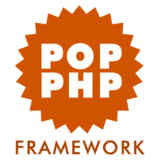Pop PHP Framework
 | |
| Developer(s) | Nick Sagona |
|---|---|
| Initial release | March 19, 2012 |
| Stable release |
3.8.0[1]
/ August 25, 2018 |
| Written in | PHP |
| Operating system | Cross-platform |
| Type | Web framework |
| License | BSD License |
| Website |
popphp |
The Pop PHP Framework a free and open source PHP Web framework that was created by Nick Sagona. It is distributed under the BSD License and hosted on GitHub. The framework is intended to be utilized for rapid application development, with an emphasis on web applications.
History
Development on the Pop PHP Framework was officially begun by Nick Sagona in late 2011, when he refactored a set of older library components into the first version of Pop PHP, which was released on March 19, 2012. The focus was for Pop PHP to become a more modern, MVC-style web framework with a set of supporting components to assist in building web applications.
After PHP 5.4 was released, Pop PHP 2 was refactored to take advantage of the new features available in PHP 5.4, as well as fully leveraging Composer by breaking out almost all of the components into separate repositories on GitHub. Pop PHP 2 was first released on July 12, 2015.
Pop PHP 3 was a slight refactor of the existing framework, while adding a handful of new components and deprecating a few older components. Version 3 supports PHP 7 and 5.6 and was released on July 9, 2016. The current version, 3.8.0, was released on August 25, 2018.
The framework has been included on a number of "best of" lists for new and up-and-coming PHP Frameworks.[2][3][4][5][6][7][8]
The Pop PHP Framework is the framework on which the open source Phire CMS project is built.[9][10]
Release history
Verision 3.8.0 is the current version that is in active development. Version 2 is still available but no longer supported. Version 1 reached end of life on March 6, 2017. A current changelog is maintained for a recent list of changes and how they impact continued development with Pop PHP.[11]
| Legend: | Old version | Older version, still supported | Current stable version | Latest preview version | Future release |
|---|
| Version | Release date | Notes |
|---|---|---|
| 1.0.0 | March 19, 2012 | |
| 1.7.0 | December 1, 2013 | Final Release |
| 1.7.0 | March 6, 2016 | EOL |
| 2.0.0 | July 12, 2015 | |
| 2.1.0 | July 8, 2016 | Final Release |
| 3.0.0 | July 9, 2016 | |
| 3.5.0 | February 27, 2017 | |
| 3.6.0 | August 31, 2017 | |
| 3.6.5 | May 15, 2018 | |
| 3.7.0 | June 28, 2018 | |
| 3.8.0 | August 25, 2018 | Current production version |
Source: Github[12]
Development
While the initial development of the Pop PHP Framework was focused on building web applications, version 3 fully supports console-based applications to be used on the CLI as well. Pop PHP incorporates current standards, trends and patterns in software development in an attempt to build an ecosystem that is familiar to developers.
Pop PHP 3 is currently written for and supports PHP 7 and is backwards compatible to PHP 5.6.
The Pop PHP Framework project welcomes community involvement and contribution via the current available channels.[13]
Features
The base foundation of Pop PHP is the initial set of core components that make up the application stack:
- The Application Object
- The Router
- The Service Locator
- The Event Manager
- The Module Manager
- The Base Controller Class
Additionally, there are 28 components that are available for use in building an application.[14] Some of the commonly used components and what they include are:
- Database Abstraction (popphp/pop-db)
- Database adapters
- Active record
- Query builder
- SQL migration
- HTTP Abstraction (popphp/pop-http)
- Request & response handlers
- HTTP clients
- File uploads
- HTML Form Generation (popphp/pop-form)
- HTML Form Validation
- PDF Generation (popphp/pop-pdf)
- PDF Creation
- PDF Import
- Mail (popphp/pop-mail)
- SMTP support
- Mail queues
- IMAP/POP client
- Auditing (popphp/pop-audit)
- Caching (popphp/pop-cache)
- Debugging (popphp/pop-debug)
- Logging (popphp/pop-log)
- Image Manipulation (popphp/pop-image)
- Views (popphp/pop-view)
- Sessions (popphp/pop-session)
- Cookies (popphp/pop-cookie)
Popcorn
Popcorn is a standalone web-based component that serves as a REST-based micro-framework layer to allow developers to quickly build REST-based web applications and APIs. With it, a developer can enforce routes by request methods and direct HTTP requests accordingly.[15] [16] [17]
References
- ↑ "popphp/popphp-framework: Release v3.8.0". github.com.
- ↑ "List of Top 10 Best PHP Frameworks". catswhocode.com. Cats Who Code.
- ↑ "List of Top 10 Best PHP Frameworks". themangomedia.com. Mango Media.
- ↑ "List of 15 New Best Frameworks". codegeekz.com. Code Geekz.
- ↑ "Comparing PHP Micro-Framworks". xbu.me. Xiangyu Bu.
- ↑ "Best MVC PHP Frameworks for Developers". bestjquery.com. Best jQuery.
- ↑ "Best PHP Frameworks". firebearstudio.com. Firebear Studios.
- ↑ "Best PHP Frameworks". indefiniteloop.com. Indefinite Loop.
- ↑ "Phire CMS". phirecms.org.
- ↑ "Phire CMS on GitHub". github.com.
- ↑ "Github: Pop PHP Framework Changelog". github.com.
- ↑ "Github: Pop PHP Framework Releases". github.com.
- ↑ "Pop PHP Development". popphp.org.
- ↑ "Pop PHP Components". github.com.
- ↑ "Popcorn". popphp.org.
- ↑ "Popcorn Overview". popphp.org.
- ↑ "Popcorn on GitHub". github.com.